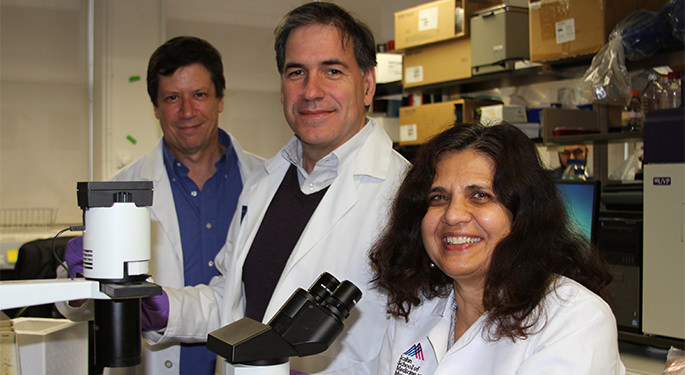Research

The endocrinologists of the Mount Sinai Health System are constantly conducting research—from basic science to clinical trials—to improve the lives of our patients. We have been at the forefront of a number of new therapies and new drug discoveries that greatly help patients with metabolic disorders, including type 1 and type 2 diabetes.
Andrew Stewart, MD, and his colleagues at the Diabetes, Obesity, and Metabolism Institute are researching a host of topics related to diabetes and metabolism. Recently Dr. Stewart and his team discovered a drug that can make pancreatic beta cell regenerate, which may be the first step in eventually developing a diabetes cure.
Carol Levy, MD, was the leading scientist in the breakthrough clinical trial for the artificial pancreas, which has led to the first U.S. Federal Drug Administration-approved artificial pancreas device. Currently Dr. Levy is conducting more clinical trials on different closed loop systems. Thanks to her work, Mount Sinai is the first and most experienced provider of the artificial pancreas in the New York City area.
Mone Zaidi, MD, leads the Mount Sinai Bone Program, which researches the effects of bone diseases on the human skeleton. Recently, he discovered a connection between a rise in a single hormone in women during menopause and weight gain. In his studies, mice who have that hormone blocked do not gain weight, which might prove significant in regulating metabolism.
Andrea Dunaif, MD, leads an international effort to map the genes for polycystic ovary syndrome (PCOS), a leading cause of diabetes in women.
Terry Davies, MD, and his research team are exploring the cause of thyroid autoimmune disease, including Graves disease, and working on developing novel treatments.
Clinical Trials
How do we bring the latest innovations to our patients? We do it mainly through clinical trials.
Should you decide to participate in a clinical trial, you may receive a new treatment that might otherwise be unavailable. At the same time, you are helping our doctors improve the care we provide to other patients. At Mount Sinai, we conduct numerous studies each year, examining the effectiveness of new therapies and procedures.
We usually start clinical trials to determine the most appropriate dosage of a new medication, to make sure the drug works and look for side effects. We call this a Phase I Trial. The next step in the process involves comparing this new drug with a current therapy that has already proven effective; this is called a Phase II trial. Participants in Phase III Trials take this drug, which has helped a small number of patients, and test its effectiveness with a larger group of patients.
The decision to participate in a clinical trial is an important personal decision, and a completely voluntary one. A clinical trial may be appropriate for you, depending on the purpose and phase of the trial. Before you can participate in a clinical trial, we will need to make sure that you meet all the eligibility criteria and you must give your informed consent. As you think about joining a clinical trial, you might want to talk about it with your doctor, family members, and friends. You can also speak with the study research staff to ask questions.
Please be sure to speak with your health care provider if you have any questions or interest in participating in any of our current clinical trials.